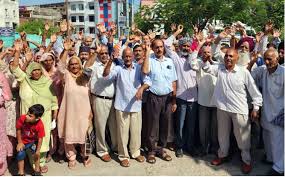Wg Cdr Mahesh Chander Sudan (Retd)
We, the people of India, have witnessed several historical ups and downs that affected the people of Jammu and Kashmir both pre and post-independence. Geographically, this piece of land wrapped in most beautiful mountainous regions of Himalayas and Pir Panchal provided ecologically rich trade connect to Europe with eastern Asian land lock and remained part of Mughal and Sikh kingdoms for centuries but escaped direct colonial rule of English Empire unlike other parts of India. However, these historical events affected local residents and forced them to migrate at times for their safety across the hills and adopt new pattern of life every time. It though enriched them culturally, artistically, theologically but left with no other option than living unsettled tribal way of life miles away from urbanization. However, the recent incidents compelling people to displace themselves from one end to the other for safety of life occurred on formation of two neighboring nations, India and Pakistan. The standalone option exercised by then Maharaja of the State of Jammu and Kashmir became a bone of contention between newly liberated neighboring countries and it led to a mischievous plan of forceful occupation by the Pakistani forces compelling people to migrate who were later classified as Displaced Persons of Pakistan Occupied Jammu and Kashmir 1947.
The partition of India gave birth to two nations based on theological lines on cessation of English Kingdom and it resulted in mass migration of people across the line drawn as International borders causing unparalleled and unprecedented misery to the affected migrants but the people of Jammu and Kashmir not only migrated but suffered breach of trust, ages old brotherhood, heavy loss of lives and unmatchable tragedy owing to mischievously activated bloodshed and forceful occupation of Jammu and Kashmir by Pakistani forces. However, on accession of then state of Jammu and Kashmir with India and intervention of Red Cross Society and other international leaderships, the displaced people from POJK were helped to escape the bloodshed and reach refugees camps raised in and around Jammu and other Indian States. These ill-fated residents who suffered loss of family members, property both moveable and immoveable became victims of unprecedented historical event. The long freedom struggle from English rule though granted self-rule to the people of India and Pakistan but uprooted ages old ancestral settlements of people of POJK, threw them homeless, selfless and at the mercy of slaughtering gangs from Pakistan whose only motive was to loot, kill, rape and slaughter these innocent poor residents.
It is unimaginable that these forced migrants have not been accorded the status of refugees and are yet referred as Displaced Persons. As per United Nations High Commission for Refugees, The UN Refugee Agency, a person forced to flee their country owing to violence or persecution and he has a well-founded fear of persecution for reasons of race, religion, nationality, political opinion or membership in a social group and most likely cannot return to their homes or afraid to do so is known as refugee. At the same time, an internally Displaced Person (IDP) is someone who has been forced to flee their home but never cross an international border. Unlike refugees, IDPs are not protected by international law or not eligible for receiving various types of aid as they are largely under the protection of their own government.
There are two most glaring points that continue to draw a line between Refugees and Displaced Persons that all those who fled their homes in 1947 post Partition or people from Kashmir who were forced to flee their homes due to fear for their lives and helplessness of the administration to provide seamless security to them are treated at par as Displaced persons despite the fact that the territory of POJK is not under the administrative control of India but illegally occupied by Pakistan forces as claimed by India. Even after a lapse of seven decades, the handicap denying the status of refugees continues to prevail for want of an amicable settlement between two neighboring nations. This administrative hurdle obstructs the government machinery to legally accept the families as refugees of 1947 and award due compensation to the survivals of this unprecedented tragedy towards their immoveable and moveable property forcefully snatched from them during this bloodshed.
These displaced people were facilitated with basic necessities of life in the migrant camps raised across the country and thereafter left to fend for themselves. The present generations of these ill-fated migrants who are time and again reminded of government paper promises of compensating their losses and to an extent of regaining POJK from illegal occupation to facilitate a dream return to their places of origins. It is more audible during elections and it is being used as a tool by political entities to seek mandate of these people, without reality but in a reel mode. No doubt, it is difficult in the present day political environment at international level to regain such a large territory from any aggressor but at the same time the justice is being denied to these claimants who qualify all other conditions except for crossing border. An empathetic approach towards these ill-fated migrants may bring some succor to them and augur way for justice to prevail in their lifetimes if not earlier generations.
This issue is very delicate and sensitive and should be dealt with due regard to the sentimental value attached to it, practical aspect on the part of Indian Government to continue its claim as a nation in the comity of nations through effective diplomatic channels and justifiably redress the most genuine grievances of the Displaced People of POJK either by compensating them in cash or in kind so that they are equally empowered like other citizens of India both politically and economically in true sense of inclusivity.


